BestReviews is reader-supported and may earn an affiliate commission. Details
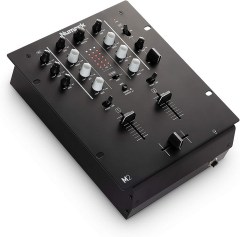
A small, portable piece of equipment that doesn't sacrifice quality sound output.
Comes in 4-channel varieties depending on your DJ settings. Has master, record, and headphone outputs. Provides separate volume and equalization controls for each channel. Sliders run smoothly in their tracks for instant use. Ideal model for scratch DJs.
USB connection has a high degree of latency.
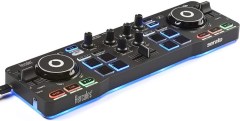
Boasts a compact, lightweight design that’s easy to travel with so you can mix music wherever you go.
Touch jog wheels make mixing easy. Features an easy-to-use bass/filter knob to create seamless transitions between songs and sounds. Four modes per deck makes this able to cue, loop and more. RGB lighting syncs with music for a colorful show.
Great for beginners but may not have all of the features a professional needs.
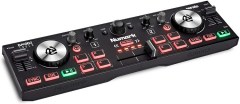
Compact design makes this easy to travel with; has a wide array of features and perks to make mixing music easy for beginners or pros.
Includes mixing software and has the ability for manual or auto looping. Plenty of outputs for sound gear, 2 channels, and crossfader provide basic mixing capabilities in addition to a built-in, high-quality sound card.
Does not come with equalizer controls.
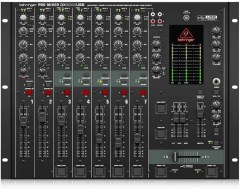
This option features the perks that experienced pros are looking for, like equalizer controls, software bundles, and more.
Includes 7 channels, crossfader, plenty of outputs, and more to make a comprehensive product. Features an EQ on/off switch and punch/cut functions, plus an energy-saving battery allows for low energy consumption.
Controls may wear out with long-term use and heavy wear and tear.
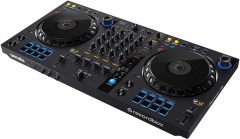
Option from a reliable brand name that works well and is easy enough for those of all skill levels to use.
Large jog wheels allow for easy scratching and pitch bending, while pre-loaded samples can be used at any time at the push of a button. Merge FX control knob makes it easy to blend songs together seamlessly. Includes 4 channels.
May have trouble connecting to sound software.

We recommend these products based on an intensive research process that's designed to cut through the noise and find the top products in this space. Guided by experts, we spend hours looking into the factors that matter, to bring you these selections.

The world has changed. DJs don't just curate a playlist of songs that are appropriate for a specific event and hit play. Instead, they have become the focal point of the music industry. DJs are the new rock stars. With enough practice and creativity, anyone can become a DJ — that is, if they have the right equipment. The keystone in a DJ's musical arsenal? A mixer.
A mixer allows the DJ to take sounds from a wide variety of sources, such as a computer, a microphone, a keyboard, or even a cell phone, and blend them into the soundtrack of an unforgettable event. The best DJ mixer will have a sufficient number of inputs for the task at hand, offer a variety of ways to route the audio, and feature intuitive and responsive controls.

Although each DJ mixer performs the same basic task — blending sounds from two or more sources — each has a slightly different focus. The best way to choose the right DJ mixer for you is to understand the controls and features so you know exactly what you need. The following is a list of controls and features that the best DJ mixers have:
Each sound you want to mix needs its own channel. If you have two music players and a microphone, your DJ mixer will need a minimum of three channels. The more sound sources that you have, the more channels you will need.
Inputs are how you physically connect your sound source to your mixer. DJ mixers should have at least two stereo RCA inputs. You may also have an XLR, quarter-inch, mini, and USB inputs. Because some channels may have multiple inputs, the number of inputs and the number of channels are not usually the same.
Gain is how you adjust the volume on the way into your mixer. You have to be careful with gain because turning it up too high will distort the sound before it even goes into your mixer, and no matter how much you turn down the volume, the sound will remain distorted. Your DJ mixer should have a gain control for each channel.
Volume is how loud the sound is when it leaves your mixer. Your mixer should have a volume control for each channel as well as a master volume slider.
Outputs are where you connect to hear the mix. The output jack can go to a headphone, it can go to a sound system, a stage monitor, or it can even go to a recorder. The more output options that are available to you, the greater the flexibility you will have with your mixer.
The EQ increases or decreases the volume of a specific band of frequencies. Most people are familiar with the two-band EQ on your radio: treble and bass. Some mixers have two-band, others have three-band EQ. The more bands your mixer has, the greater control you will have over the sound. Some mixers include a "full kill" option, which allows the DJ to completely silence a desired band of frequencies for a dramatic effect.
Your DJ mixer needs to have some type of meter. This is usually a series of lights that move from green to yellow to red that alert you when the volume is too loud. Running your mixer in the red can damage your sound system.
Like it sounds, a crossfader allows you to fade one sound source out while fading another one in, thus creating a seamless changing of sounds. The best DJ mixers feature crossfaders with additional controls that allow you to fine-tune their functionality.
If you think your mixer is not going to take a beating, you're wrong. Even if you're using it for weddings instead of clubs, you’ll want the most durable unit you can find. Otherwise, you'll be buying a new mixer every few gigs.

Inexpensive: You could get a very basic DJ mixer for as low as $45. At this level, however, you need to be careful that the unit is decent and that it doesn't add extraneous noise to the mix due to inferior elements.
Mid-range: For around $80 to $150, you will likely be able to find what you need. In this range, a DJ mixer can not only be a high-quality item, but it might also start to include some of the additional features that will make you sound even better.
Expensive: Once you move beyond $150, you are getting additional channels and components that move you into the realm of a DJ controller. (See the FAQ section below for more information on this.) This is fine and may be desirable depending on your situation, but it's important to know that at this higher price range, you'll be getting something a little different than a mixer.
In many ways, learning to use a DJ mixer is like learning to play a musical instrument — it may look easy when you see someone else doing it, but it can take a while before you understand how to make it sound good. The following are a few important tips to keep in mind as you venture into the world of sound mixing:

Q. What is the difference between a DJ mixer and a DJ controller?
A. In the most basic sense, a mixer accepts the input from two or more audio sources, blends them together, then sends all those signals out as a new composite. A controller, on the other hand, is like a mixer on steroids. It is an all-in-one unit that doesn't just mix the sound coming in, but it can control what is coming in as well, triggering new sounds and slowing down or speeding up tracks so they blend better. The line can get a little blurry because controllers have a built-in mixer and some mixers have features that are usually reserved for controllers.
Q. Why are mixers with fewer knobs and sliders sometimes more expensive?
A. A car isn't fast because it looks fast; a car is fast because of what is under the hood, the part you don’t see. The same is true for mixers. Yes, you need knobs and sliders that turn and glide effortlessly, but the quality of sound is ultimately determined by the electronics that are not visible. Sometimes, the most expensive DJ mixer is very basic looking. Other times, the outer design reflects what’s beneath. It takes a little research to know what you are really getting.
Q. What is clipping?
A. There are many ways to increase the volume of an audio signal besides the volume control. Effects, EQ, gain, and even simply mixing multiple audio signals can all increase the overall volume. When the level gets to be too much for your system to handle, the signal is clipped (distorted) — you will know this because the meter on your DJ mixer is in the red and it will sound kind of crunchy. Playing a clipped signal isn't just unpleasant for your ears, it also makes your speakers behave abnormally and it can permanently damage them.
Get emails you’ll love.
Learn about the products you’re wondering if you should buy and get advice on using your latest purchases.
